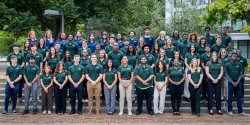
New Jersey Resources is an energy services holding company based in Wall Township, New Jersey. It is a Fortune 1000 company, and a member of the Forbes Platinum 400. New Jersey Natural Gas is its principal subsidiary.
Deliverables
This Green Team will assist New Jersey Resources with waste management and policy analysis to drive more local food-related emissions recovery and energy capture through the following deliverables:
- Conduct research and analysis on current state policies on food waste as they relate to feasible and profitable energy capture from food waste emissions
- Propose amendments to P.L. 2020. cc. (N.J.S.A. 13:1E-99.122) and the rationale behind the recommendations
- Identify and map food waste sources and facilities within New Jersey Natural Gas service territory
- Provide an estimate of vegetative waste tonnage disposed of within NJNG service territory and analysis of RNG volumes that could result from using synthetic gasification with this waste
- Translate increased potential into RNG volumes, costs & emissions reductions
- Summarize requirements for NJR to transition to using gas in ways recommended through sources identified and with policy changes recommended

The Port Authority of New York and New Jersey is a joint venture between the U.S. states. The Port Authority was established in 1921 through an interstate compact authorized by the United States Congress. The Port Authority oversees much of the regional transportation infrastructure, including bridges, tunnels, airports, and seaports, within the geographical jurisdiction of the Port of New York and New Jersey. This 1,500-square-mile (3,900 km2) port district is generally encompassed within a 25-mile (40 km) radius of the Statue of Liberty National Monument.[2] The Port Authority is headquartered at 4 World Trade Center.
The Port Authority operates the Port Newark–Elizabeth Marine Terminal. This terminal handled the third-largest volume of shipping among all ports in the United States in 2004, and the largest on the Eastern Seaboard.[3] The Port Authority operates six bi-state crossings: three connecting New Jersey with Manhattan, and three connecting New Jersey with Staten Island. The Port Authority operates six bi-state crossings: three connecting New Jersey with Manhattan, and three connecting New Jersey with Staten Island. The Port Authority Bus Terminal and the PATH rail system are also run by the Port Authority. The Port Authority oversees LaGuardia Airport, John F. Kennedy International Airport, Newark Liberty International Airport, Teterboro Airport and Stewart International Airport. The agency has its own 2,232-member Port Authority Police Department.[4]
The Green Team serving the Port Authority of New York and New Jersey will contribute toward ensuring Port operations and equipment are functioning as sustainably as possible by:
- Collecting and analyzing sustainability data, e.g., emissions at ports utilizing two independent databases – (1) building utility data such as heating, cooling, electricity consumption, etc., and (2) tenant site data, including vessels
- Building a model based on data from previous invoices and utility consumption. The goal will be to build the baseline and construct the model so that staff can use consumption rates starting from Jan. 1st, 2018 and determine what measures are needed to achieve a 50% reduction by 2030. This will involve filling in gaps in historical data by extrapolating data and using this to project future data and consumption
- Creating an energy consumption calculator
- Assist PANYNJ to map assets that can help reduce resource use and waste. For example, to know where below-ground valves are and be able to shut them off in the event of a below-ground leak. To do this, PANYNJ team members will integrate existing asset data into a GIS platform by: Creating a GIS inventory of ~60 fire hydrants
- Developing a GIS layer showing the associated valves digitized from PANYNJ’s previous GIS and CAD files
- Tracking approaches and building a plan for next steps in asset digitization for PANYNJ
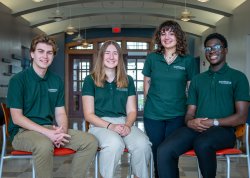
Hackensack Meridian Health (HMH) is a network of healthcare providers in New Jersey, based out of Edison. Members include academic centers, acute care facilities, and research hospitals. Hackensack Meridian Health’s goal is to create one integrated network that changes how healthcare is delivered in New Jersey. The HMH network was formed in 2016 by a merger between Hackensack University Medical Center and Meridian Health. Hackensack Meridian Health is affiliated with the Hackensack Meridian School of Medicine and maintains active teaching programs at its hospitals. After the acquisition of JFK Medical Center in Edison, HMH is now the largest healthcare provider in New Jersey.[1][2]
A PSEG ISS Green Team will assist Hackensack Meridian Health in structuring a sustainable transportation program for a health system through the following deliverables:
- Research methods of vehicle tracking
- Identify structures and software to log transportation use and emissions
- Add information into Practice Green Health data platform
- Recommend strategies to reduce overall fuel consumption
- Propose goals for the overall program and realistic steps to achieve them

Memorial Sloan Kettering Cancer Center (MSK or MSKCC) is a cancer treatment and research institution in the borough of Manhattan in New York City. Founded in 1884 as the New York Cancer Hospital, MSKCC is one of 52 National Cancer Institute–designated Comprehensive Cancer Centers. Memorial Sloan Kettering Cancer Center (MSK) has been ranked as the number two hospital for cancer care in the nation.
Main Project
- Evaluate occupant and community health benefits of green building design and construction
- Identify metrics and key performance indicators (KPI’s)
- Use available data from MSK, healthcare industry groups (e.g., Practice Greenhealth, HCWH) and peer reviewed literature to suggest metrics and KPI’s. These data can be used to assess health and productivity benefits (e.g. air quality measures, lighting, alternative to chemicals of concern)
- Assess data and information from MSK’s green buildings as they relate to the US Green Building Council’s “Research Anthology of Health-promoting Building Strategies.” Determine what information should be considered in determining related health outcomes
- Investigate how the following might contribute to positive health outcomes
- LEED certifications in design
- WELL certification in design
- Elimination of chemicals of high concern (CoHC)
- Memorial Sloan Kettering’s (MSK’s) vendor criteria described in their product selection guidance, MSK Design Guides (e.g., Flooring Guide, Design Guide, D+C Design Guidelines, etc…) and Design x Sustainability documentation
- Examine the relationship between green buildings and effect on Social Determinants of Health
- Conduct a financial analysis
- Analyze value of monetary investments relative to health outcomes
- Describe the value-added components of green building
- Analyze and compile information available on increase staff productivity and satisfaction of green building and healthy interior design
- Building on these analyses, describe how these benefits can best be realized in MSK’s New Cancer Care Pavilion to be built on Manhattan’s upper east side by 2030
- Identify metrics and key performance indicators (KPI’s)
- Deliver polished report and succinct one pagers for delivery of green building in health care business case
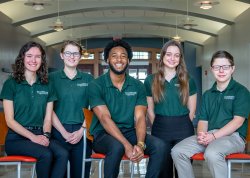
New Jersey Transit Corporation, branded as NJ Transit and often shortened to NJT, is a state-owned public transportation system. They serve the U.S. state of New Jersey and portions of New York state and Pennsylvania. It operates bus, light rail, and commuter rail services throughout the state. These connect to major commercial and employment centers both within the state and its two adjacent major cities, New York City and Philadelphia. In 2022, the system had a ridership of 175,960,600.
Deliverables
- Assess placement, and type of current trash and recycling bins at locations including corporate, rail, light rail, and bus facilities.
- Design uniform language for bins and bin placement. Additionally, create uniform signage that is clear and understandable regarding what must go in a waste bin and what may go in a recycling bin.
- Running three analyses to better understand NJ TRANSIT’S current methods of recycling, this included a; SWOT analysis, Gap analysis, and Policy analysis. These analyses will give NJ Transit a better understanding of how to move forward in its waste management plan.
- Creating a survey to ask facility managers about their knowledge of the recycling efforts, and employee engagement with recycling.
- Develop signage to encourage and bring attention to single-use plastics, using reusable dining ware, and other sustainable practices for employees to reduce their waste.
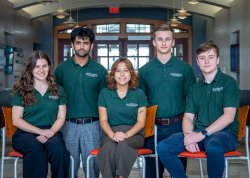
Stryker Corporation is an American multinational medical technologies corporation based in Kalamazoo, Michigan. [2] Stryker’s products include implants used in joint replacement and trauma surgeries; surgical equipment and surgical navigation systems; endoscopic and communications systems; patient handling and emergency medical equipment; neurosurgical, neurovascular and spinal devices; as well as other medical device products used in a variety of medical specialties.
Deliverables
- Investigate and analyze incentives and resources that will increase sustainability in the following focus areas:
- operational carbon emissions (scope 1 & 2)
- value chain carbon emissions (scope 3)
- waste reduction
- sustainable design (products & packaging)
- Identify sustainable opportunities and cost savings/incentives through the following deliverables:
- Investigate the optimal mix of the following that will deliver 100% renewable energy:
- renewable energy procurement, Power Purchase Agreements, onsite renewable technologies and options (exploring different funding approaches i.e. capital vs. energy as a service), Renewable Energy Credits across the world
- Conduct analysis and project the mix from the above options that will deliver the best aggregate ROI
- Develop a database containing financial incentives and rebates for sustainability related initiatives that are focused mainly on renewable energy and energy efficiency from:
- local utilities
- counties, states, federal
- sustainable R&D credits
- Inflation Reduction Act (IRA) provisions
- Identify other cost saving and incentivized opportunities for the above focus areas
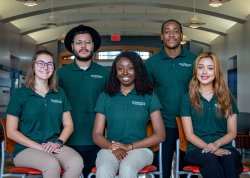
Firmenich SA is a private Swiss company in the fragrance and flavor business. It employs 10,000 people across 46 manufacturing plants and six research and development centers. The company has created perfumes for over 125 years and produced a number of well-known flavors. It is the largest privately owned company in the field and ranks number two worldwide.[1]
In May 2022, a merger agreement with DSM was reached to create a leader in beauty, nutrition and wellbeing products, to be named DSM-Firmenich. The merger is expected to be completed by mid-2023. [2]
Deliverables
A PSEG ISS Green Team will assist Firmenich with sustainable lab management by establishing a ‘green lab’ program with focus areas and communications to share each quarter. Some ideas for focus areas: waste reduction, recyclable laboratory consumables, energy savings, etc.
- Project Charter / Timeline
- Written project implementation plan (this will be used for best practice sharing across Firmenich)
- Communication strategy
- Quarterly focus areas (implementable actions with solutions)
- Quarterly communications (tied to the focus areas)
- Metrics
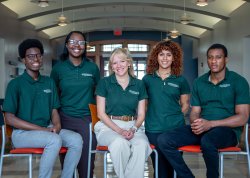
The Public Service Enterprise Group (PSEG) is a publicly traded diversified energy company headquartered in Newark, New Jersey, US established in 1985 with a legacy dating back to 1903. The company’s largest subsidiary is Public Service Electric and Gas Company (PSE&G). The Public Service Electric and Gas Company is a regulated gas and electric utility company established in 1928 serving the state of New Jersey[3]. Originally a subsidiary of the New-Jersey-based Public Service Corporation, it is New Jersey’s oldest and largest investor owned utility company.
Deliverables
- Data, Metrics, KPIs, frameworks
- Competitor analysis
- An Internal DEI data and report with a focus on community impact for the PSEG Foundation
- SWOT analysis
- TNFD framework skeleton
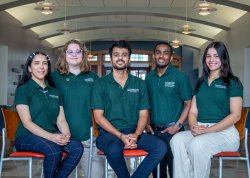
Develop a campaign to promote recycling and reuse that is informed by research. This can be used to plan a pilot project to investigate how well an outreach campaign over the course of the 2023 – 2024 academic year achieves targeted waste reduction.
- Investigate environmental impacts from trash generated from dormitory move-outs
- Connect with the various departments within University Facilities to collect data on related current waste and recycling quantities on campus
- Prepare outreach materials.
- Research options for donation, reuse, and/or recycling of students’ gently used furniture, kitchenware, clothes, supplies, etc.
- University Garden High-clearance robotic irrigation system
- This system is planned to be used for in-season nutrient management of gardens. It is responsible for timing the correct delivery of the amount of nutrients that plantings need. While also working to improve overall irrigation efficiency, estimating the volume of water needed by a set of plantings and its required rate of supply.
- Implementing soil irrigation systems in urban settings with sensor technology
- Collect data to evaluate water savings if direct water application is implemented in both in campus community gardens and on campus lawns and horticultural plantings vs. spray irrigation.
- Analyze data and make recommendations based on pilot study results.
- Collect data remotely using technologies that will be integrated into sensor systems to capture the Water Usage
- Waste tonnage – bottles removed from waste stream, filter replacements for refilling stations, etc.
- Develop a survey to determine what would motivate users to use a bottle filling station vs purchasing bottled water.
- Create promotional materials to encourage use of reusable water bottles & bottle filling stations over purchased single-use bottles. Materials include a QR code & information for the Fill it Forward app/program and social media/email content.
- Informational materials including posters to be hung at bottle filling stations.
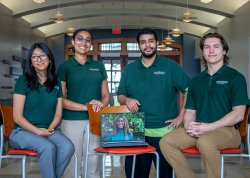
The Newark Community Food System is a non-partisan collective of deeply engaged community leaders based in Newark, NJ. A partnership with Newark Science and Sustainability Inc. and Whole Cities Foundation, they support and develop sustainability efforts in urban agriculture, wellness and nutrition.
Communications
- Create an Urban Agriculture social media campaign, including infographics and infomercials
- Use data and visual storytelling to include intergenerational involvement, diversity, and health benefits to explain how urban agriculture contributes to the wellness of the community and the local economy.
Engagement
- Recommend improvements to engagement for growing the existing volunteer system of NCFS.
- Organize and execute a local growers meet-up in July to begin preparations for the 2023 Citywide Garden Tour.
- Improve Newark SAS’ and NCFS’ websites and build data dashboards connected to in-garden technology.
- Support data collection within the NCFS network to generate impact statistics.
- This may include mass and nutrition of produce grown, number of people served, economic relief from access to local produce, etc.
- Create an interactive digital map, and a basic printed map to be put into a pamphlet. These can be used in tandem with our Citywide Garden Tour that runs during the second week of September.
